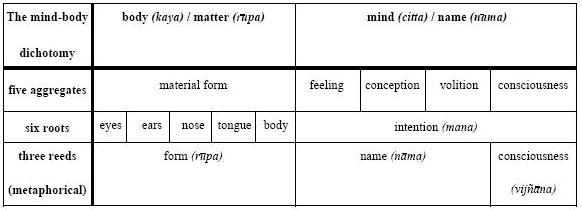Principles
The principles and rules used in this school are derived from the Buddhist religion. There are two main divisions of Buddhism: Mahayana and Theravada. Each of them also includes a number of schools which differ in their principles. However, all Buddhists use meditation practices to reach their goals.
Values
Buddhists believe that any conception of “self” is an illusion; no separate “self” exists, only a collection of parts (Mosig, 2006, p.42). Still, the person (who is a connection of certain components) is real.
Besides, according to Buddhism, there are four Noble Truths:
- suffering is a part of life,
- which is due to our craving of life to be different;
- but we can dispose of craving
- if we discipline ourselves and follow the Buddha’s path of wisdom and morality, for which it is necessary to practice meditation (DeMoss, 2011; Tyson & Pongruengphant, 2007).
It might be said that disposing of craving is disposing of the component responsible for craving.
Subject Matter and Problems Addressed
In Mahayana Buddhism, the ultimate goal is to achieve complete enlightenment. In Theravada Buddhism, the final aim is to break samsara (the endlessly repeating cycle of suffering, death, and rebirth) and reach the state of Nirvana. The psychological practices such as meditation, controlling one’s thoughts and emotions and modifying one’s behavior are aimed at these goals.
Research Methods and Other Applied Methodologies
Buddhism is grounded in the ancient teachings and uses meditation practices in order to reduce or eliminate craving and ignorance, control one’s behavior, emotions and feelings, and enlighten oneself.
Influence between Buddhist and Western Psychologies
Buddhism is an ancient school of thought, much older than Western psychology, and any attempt to speak of “Buddhist psychology” is an attempt to re-formulate certain parts of Buddhism using Western languages and concepts. In Buddhist psychology, usually parts of Buddhist teachings and practices (such as meditation and other mind techniques) are integrated into the Western frameworks, which often proves effective (Tomasino, Chiesa, & Fabbro, 2014).
The general topic of my research is “the relationship between the body and the mind”, whereas the specific question I would like to answer is “to what extent do psychological factors and physiological factors influence a person’s character, reactions, and behavior?”
If I had chosen the Buddhist approach for my research, it would still be possible to formulate the general topic in a similar way. It is supposed that there is a distinction between two concepts in Buddhist teachings that might in some cases be interpreted as analogs of the body and the mind (Lin, 2013, p. 240). However, this division is not absolute, but only provisional in Buddhism (Lin, 2013, p. 241); it is suggested that any rigid distinction between mind and body should be dropped (Samuel, 2014, p. 575).
However, in my previous papers it was noted that I believe that the mind and body are a single, united thing, and that the distinction between the two is only used because it describes the two phenomena that appear qualitatively different to us. Therefore, it is apparent that the general topic I have chosen is compatible with the Buddhist teachings.
It is interesting, though, that the understanding of the concept analogous to the “body” in Buddhism is different than the Western one (see Fig. 1). So, instead of using the concepts “body’ and “mind”, it might be more useful to reformulate the topic by using more specific terms “physiology”, “consciousness”, “behavior”, etc. The same would occur if I attempted to reformulate my question; I would have to substitute the word “psychological” with terms such as “memory”, “feelings”, etc., which might prove difficult to a certain extent.
Besides, the very question does not belong in the tradition of Buddhist teachings, and it appears that it could not be answered properly by using Buddhist methods. Therefore, it would perhaps be not productive to seek answers to this question in the Buddhist tradition.

References
DeMoss, D. (2011). Empty and extended craving: An application of the extended mind thesis to the four noble truths. Contemporary Buddhism, 12(2), 309-325. Web.
Lin, C. (2013). Rethinking mind-body dualism: A Buddhist take on the mind-body problem. Contemporary Buddhism, 14(2), 239-264. Web.
Mosig, Y. D. (2006). Conceptions of the self in western and eastern psychology. Journal of Theoretical and Philosophical Psychology, 26(1-2), 39-50. Web.
Samuel, G. (2014). Between Buddhism and science, between mind and body. Religions, 5(3), 560-579. Web.
Tomasino, B., Chiesa, A., & Fabbro, F. (2014). Disentangling the neural mechanisms involved in Hinduism- and Buddhism-related meditations. Brain and Cognition, 90, 32-40.
Tyson, P. D., & Pongruengphant, R. (2007). Buddhist and western perspectives on suffering, stress, and coping. Journal of Religion and Health, 46(3), 351-357.